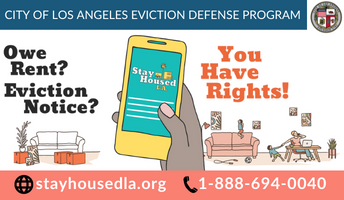Background
On June 23, 2021, the Los Angeles City Council adopted the Tenant Anti- Harassment Ordinance (TAHO) #187109 which prohibits landlords from harassing tenants by actions such as removing housing services, withholding repairs or refusing to accept rent payments. The Ordinance is effective August 6, 2021, and applies to ALL residential units in the City of Los Angeles.
About
What is tenant harassment?
Tenant harassment is when a landlord knowingly takes actions that cause harm to a tenant and serve no lawful purpose – including repeated acts that substantially interfere with the comfort, peace or quiet enjoyment of a tenant’s rental unit.
Click here to view the Tenant Anti-Harassment flyer in Spanish
What are the harassment laws in the City of Los Angeles?
The Tenant Anti-Harassment Ordinance protects tenants from landlord harassment, which may also include other conduct not mentioned below. Landlords are prohibited from doing the following acts if done to harass the tenant:
- Taking away services provided in the lease (housing services).
- Refusing to do required repairs.
- Entering the apartment without proper notice.
- Threatening a tenant with physical harm.
- Attempting to coerce the tenant to move-out with offer(s) of payments.
- Using lies or intimidation intended to make a tenant move out.
- Threatening or serving an eviction notice based on false reasons.
- Intentionally disturbing a tenant’s peace and quiet.
- Refusing to accept rent payment.
- Inquiring the immigration or citizenship status of a tenant.
- Threatening to disclose immigration/citizenship status information about a tenant.
- Threatening to disclose tenant information to a gov’t agency to influence them to move.
- Engaging in activity prohibited by federal, state, or local housing anti-discrimination laws.
- Threatening/interfering with tenant organizing activities (tenant associations and unions).
- Interfering with a tenant’s right to privacy.
If you believe you are being harassed, call LAHD: 1-866-557-7368
Frequently asked questions (FAQs)
Tenants should request their repairs in writing and keep a copy of the written notice. Tenants may use the LAHD form title, Tenant Request For Repair and/or Maintenance. If the landlord does not respond, the problem should be reported to LAHD Code Enforcement Unit (888-557-7368) for multi-dwelling units or LADBS (888-LA4-BUILD) for condominiums or single family dwellings.
It is important for tenants to keep records by taking notes of each harassing event. Tenants should keep a log with dates and times, get statements from neighbors, and take pictures. If a tenant feels that they are in physical danger, they should call the LAPD or dial 911.
Yes, a tenant has a private right of action and may file a civil case against the landlord. Please click here for legal referrals.
The Tenant Anti-Harassment Ordinance protections apply to all residential tenants in the City of Los Angeles, regardless of whether the unit is subject to the Rent Stabilization Ordinance (RSO).
Yes, but there are strict rules about how this is done. The buyout agreement must be in writing and accompanied with the RSO Disclosure Notice. A tenant can cancel a buyout for any reason for up to 30 days after both the landlord and tenant have signed the agreement. Landlords cannot force the tenant to move with offers of payments.
Violation of the ordinance can be either a criminal misdemeanor (up to 6 months in jail or a $1,000 fine for each offense), or a civil violation (damages, rent refunds for reduction in housing services, reasonable attorney’s fees and costs, fine of up to $10,000 per violation, or tenant relocation).
Reference(s):
Disclaimer
The City of Los Angeles provides this material for general informational purposes only. The information provided here does not, and is not intended to, constitute legal advice.
You should contact a licensed attorney to obtain advice with respect to any particular legal matter. Only your individual attorney can provide assurances that the information contained here, including your interpretation of it, is applicable or appropriate to your particular situation. Use of, and access to, the resources contained here do not create an attorney-client relationship between the reader, user, or browser and the authors or contributors, including the City of Los Angeles or its staff.
All liability with respect to actions taken or not taken based on the information provided is hereby expressly disclaimed. The content provided “as is;” no representations are made that the content is error-free.








